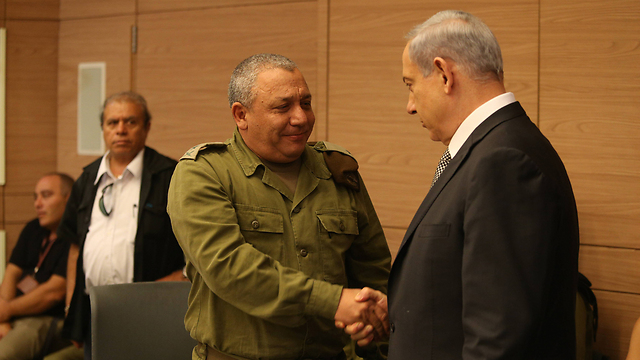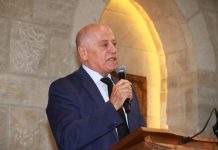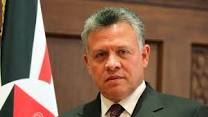رئيس الأركان الإسرائيلي الجديد: سنضرب آلاف المواقع والأهداف في لبنان
غداة إعلان رئيس الوزراء الإسرائيلي ووزير أمنه موشيه يعلون عن تعيين الجنرال غادي ايزنكوط رئيساً جديداً لهيئة الأركان العامة للجيش الإسرائيلي، خلفاً لرئيس الأركان المنتهية ولايته بيني غانتس، خرج ايزنكوط بتهديدات شديدة اللهجة للبنان والدولة اللبنانية.
وقال في تصريحات نشرتها صحيفة “يديعوت أحرنوت” إنّه يتحتّم على إسرائيل في المواجهة القادمة مع حزب الله اعتبار كلّ لبنان كأنّه الضاحية الجنوبيّة، التي قام الجيش الإسرائيليّ بتدميرها كليًا في حرب تموز بصيف العام 2006.
وتابع الجنرال أيزنكوط قائلاً: كلّما زاد “حزب الله” من ضربه للعمق الإسرائيليّ، فإنّ الجيش الإسرائيلي سيزيد من توجيه الضربات القاسية له داخل لبنان، لافتاً إلى أنّ القدرة والمعرفة اللتين يتمتّع بهما الجيش الإسرائيليّ، قادرتان على حلّ لمشكلة القصف الصاروخيّ المتوقّع من قبل حزب الله وسنضطر إلى قصف القرى والبيوت في الجنوب اللبنانيّ، والتي حوّلها حزب الله إلى مخازن أسلحة”.
وهدّد أيزنكوط، بأنّ الحرب القادمة في لبنان ستكون باستعمال قوة هائلة أكثر ممّا تعودنا عليه في الماضي، وبالتالي فإنّ النتائج في المواجهة القادمة على الطرف الثاني ستكون صعبة للغاية، وإسرائيل عليها أن تلجأ في المواجهة القادمة إلى اعتبار كلّ لبنان ضاحية جنوبيّة.
وهدد رئيس الأركان الإسرائيلي الجديد بتوجيه ضربة عسكرية تفوق عشرة أضعاف الضربة العسكريّة التي وجهها الجيش الإسرائيليّ خلال العدوان على لبنان في صيف العام 2006، في حال نشوب مواجهة عسكرية جديدة.
وأكّد أنّه لن يردع إسرائيل أيّ شيء، وسنضرب آلاف المواقع والأهداف في لبنان، واعتقد أنّ حزب الله يُدرك ذلك تمامًا وهو غير معني بفتح معركة جديدة على الحدود الشمالية.
وأضاف: صحيح أنّ الجبهة الداخلية الإسرائيليّة ستتعرض لإصابات، ولكنّ الجيش الإسرائيليّ حسّن قدراته بشكل كبير للغاية، وبالتالي فإنّ الخسائر التي سيتكبدها الطرف الثاني ستكون وخيمة جدًا، وعلينا ألّا نخشى من حزب الله، ولكن من غير المعقول أنْ تسمح إسرائيل لإرهابيين بأنْ يتكلموا ويسببوا الخوف للشعب في إسرائيل.
IDF’s 21st chief of staff Gadi Eisenkot’s test
Ron Ben-Yishai/Ynetnews
Published: 12.01.14, / Israel Opinion
Analysis: Can the new chief of staff lead a change in the army’s operation perception which will make the IDF more aggressive and offensive and more capable of defeating an asymmetric enemy?
Gadi Eisenkot is about to enter the position of the IDF’s 21st chief of staff from an almost ideal starting point. In the history of the Israeli army, there have not been many candidates for this role with so much consensus around them.
Follow Ynetnews on Facebook and Twitter
Even Prime Minister Benjamin Netanyahu, who hesitated as he found the current deputy chief of staff to be somewhat “pale,” did not insist when he realized that Defense Minister Moshe Ya’alon was convinced that Eisenkot was the right man for the job and was determined to present him to the government as his candidate to replace Benny Gantz.
Ya’alon used a summary of the opinions of former senior IDF and defense establishment officials, who he consulted recently, to back his choice. That may have also influenced Netanyahu’s decision.
The following picture shows Eisenkot and Ya’alon flying back on a chopper from the memorial service for Israel’s first prime minister, David Ben-Gurion, in Sde Boker, as the defense minister showed the deputy chief of staff the following text message on his cell phone: “We hereby declare that you have been chosen to be the next chief of staff.” Eisenkot responded with a big smile.
In any event, most of the IDF’s generals and senior field commanders believe Eisenkot is the right choice at this time and under the current conditions. They all regard his thinking and analysis abilities, his quiet and natural leadership and his personal integrity very highly.
The vast and diverse experience Eisenkot has accumulated in command and staff positions on all levels is as important, and so it his up-to-date and deep familiarity with the army and its missions.
All these will allow him to enter the chief of staff’s office after a short changeover period with Gantz, gain harmonic cooperation and industrial peace from the generals, avoid hasty moves which will get Israel in trouble, and maybe even create a change which will make the army more offensive and creative in its methods of action.
There are those who question Eisenkot’s ability to make the required change in the IDF’s operation doctrine, a change which will allow an unequivocal victory and long-term deterrence in the expected conflicts with Hezbollah, Hamas and maybe even with the Islamic State and Jabhat al-Nusra.
There are politicians in key positions, senior defense establishment officials and ordinary citizens who see Eisenkot as a full partner in the planning and management of two military operations – the Second Lebanon War and Operation Protective Edge – in which the IDF failed to achieve an unequivocal victory.
The Winograd Commission commended his performance as head of the Operations Directorate during the Second Lebanon War. He realized right away that it was a war and suggested (and perhaps even demanded) a wide-scale call-up of reservists and the bombing of civilian and military infrastructures in Lebanon.
Then-Chief of Staff Dan Halutz rejected the offer to call up reserve forces, and when the units were eventually called up after three weeks of war, they entered the fighting unequipped, without proper trained and with unsuitable fighting methods. The infrastructure targets were not bombed because then-Prime Minister Ehud Olmert did not approve it for fear of the US administration’s reaction.
Eisenkot was right. He was also right in his criticism after that war regarding additional aspects of the way the fighting was managed on the ground, which he did not approve of.
At the same time, however, we can’t deny the fact that as head of the Operations Directorate he was almost as responsible as the chief of staff and as the other generals for the failures and faults of the “maneuver” (the ground operation) during the war.
There are those who argue that some of those faults were apparent in Operation Protective Edge as well, which was an operation planned and managed by Gantz and Eisenkot, who were a highly influential factor in the cabinet and Defense Ministry.
In Operation Protective Edge, like in the Second Lebanon War (and in Operations Accountability and Grapes of Wrath before it), the IDF preferred to reach the battle’s goals by counterfire (from afar) rather than through an aggressive maneuver.
This critics of this method say that in both cases the fire alone did not generate the desired results. The Air Force achieved impressive local results, but was incapable of destroying the tunnels and stopping the rocket fire at Israel’s home front. The same applies to the accurate fire from the ground and from the sea. The ground operation was delayed, was cumbersome and was subject to changes and improvisations which extended the fighting unnecessarily.
The main criticism directed at Gantz and Eisenkot’s General Staff was that they preferred not to take the risks involved in quick ground moves deep inside the Gaza Strip, beyond the shield set up by Hamas and the Islamic Jihad, basically giving up the ability to reach a victory and long-term deterrence.
The reason for that, according to the critics, was the fear of losses among the fighters, which led to the extension of the fighting and to more casualties. There was a concern that overly aggressive moves on the ground would lead to diplomatic pressure to stop and void hitting uninvolved civilians, so as not to reach the International Criminal Court in The Hague.
Eisenkot himself demonstrated in his fighting career that he is a supporter of the “indirect leverage method” from the Ehud Barak school, which aims to deter the enemy and end the fighting. Such an approach can never lead to a physical defeat, especially not of an irregular military.
Why is all this relevant today? Because in Israel there is no procedure of a public hearing in the parliament for candidates for a senior position in the security-intelligence establishment, like in the United States for example. So anyone trying to assess the next chief of staff’s policy and methods of action can reach conclusions only by analyzing his actions and opinion in the past.
The challenges Eisenkot is facing are no secret. They are led by a change in the entire army’s operation perception in a way which will make the IDF aggressive and offensive and more capable than before of defeating an asymmetric enemy.
An Air Force with an unusual quality of performance, and an intelligence community which has undergone a positive revolution and better able to serve the fighters than before, cannot deliver the goods alone. What is needed is a “finishing move on the ground”, and Eisenkot will have to find or invent it before the third Lebanon war breaks out against Hezbollah and perhaps even against Syria.
Eisenkot is one of the first and leading architects of the “Dahiya doctrine,” a military strategy in favor of a significant and painful aerial strike on all of the other side’s assets in Lebanon in order to shorten the rocket and missile fire at Israel’s home front. The problem is that aerial force alone will not suffice, and Eisenkot will have to add ground activity from the front to the enemy’s strategic depth.
The second most important challenge is the two Palestinian arenas, in Judea and Samaria and in Gaza. In the West Bank and in Jerusalem, he will have to find a way to suppress a popular uprising and lone wolf terrorist attacks without igniting an armed intifada, a regional flare-up and a religious war.
In Gaza, the challenge is to maintain deterrence, prevent the terror organizations from growing stronger and allowing the reconstruction of the Strip and its economy in order to bring about a long-term calm.
The third challenge is the budget cuts, by reducing the army while maintaining full competence and preparedness. The inflated headquarters are the fat which still can and should be cut in order to deal with a hostile budgetary environment.
The fourth challenge is developing new and efficient defensive and offensive methods and weapons, in order to deal with the jihadist Islam on the border with minimum losses and damage. ISIS and Jabhat al-Nusra are already on the fence or approaching it in the Golan Heights and in Sinai, but we are currently not their top priority.
Thus, this period of time should be used to prepare for a fight against an enemy which has no clear addresses, and whose military assets cannot be destroyed therefore with counterfire without harming innocent people. In addition, it has many fighters with a “death wish” and is therefore hard to deter.
Another challenge is maintaining and developing the “strategic long arm” abilities, in order to neutralize a clear and present danger stemming from Iran’s military nuclear project, among other things.
The sixth challenge is to build a professional and diverse General Staff with trust and between its members and open-mindedness. Eisenkot is apparently not the only one with this trait among the current generals. He will be tested for his ability to conduct brainstorming sessions and open disagreements with these professional and strong-minded people and convince them to act in a way he approves of.
It won’t be too difficult. Thanks to his friendly cooperation with Gantz in regards to the appointments as well, during the changeover period Eisenkot will find a good team of generals which will be able to work with him in harmony and highly regards him.
Another round of appointments is expected in the near future of generals with combat experience and original thinking which was demonstrated on several occasions: Yair Golan as the deputy chief of staff, Nitzan Alon as head of the Operations Directorate and Noam Tibon as the Central Command chief.
With such a General Staff, and with warm support from the political echelon, the Golani-bred Eisenkot has quite a good chance of meeting expectations: Maintaining the relative advantages Gantz gave the IDF and adding a creative-offensive layer on the ground.






















